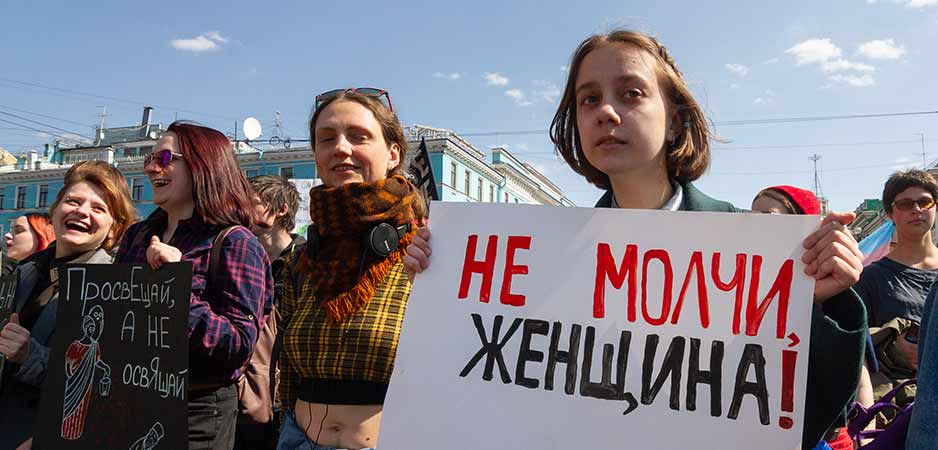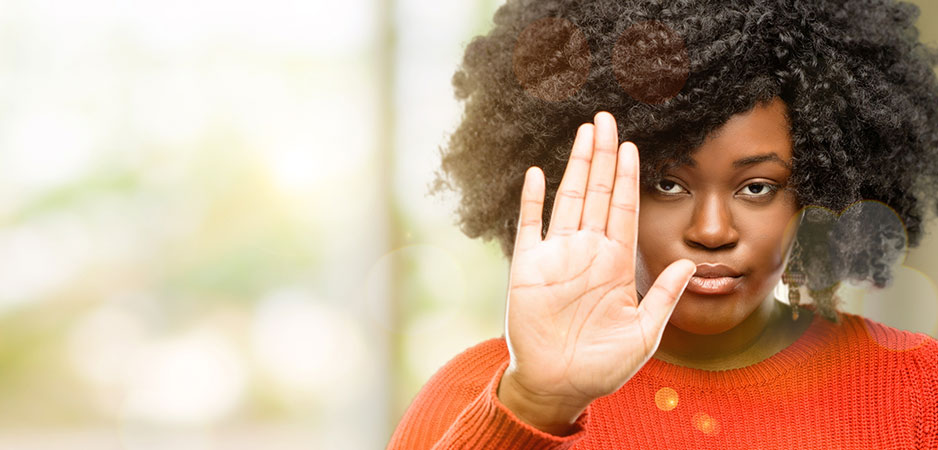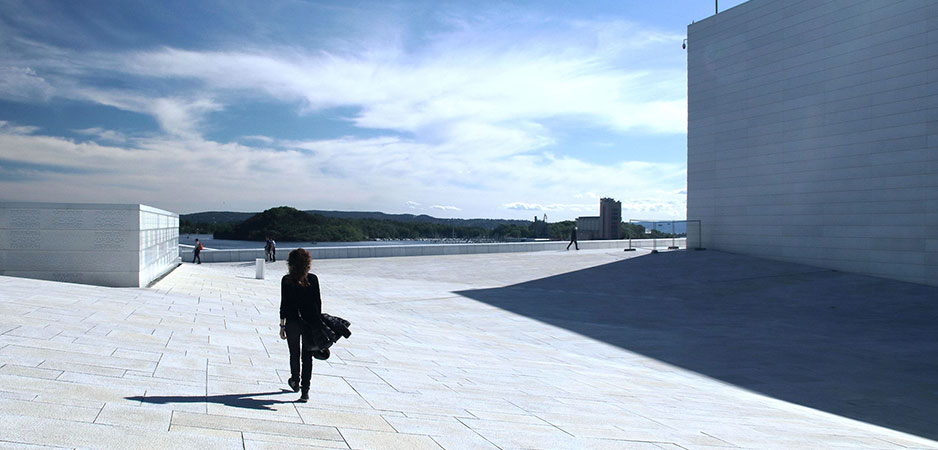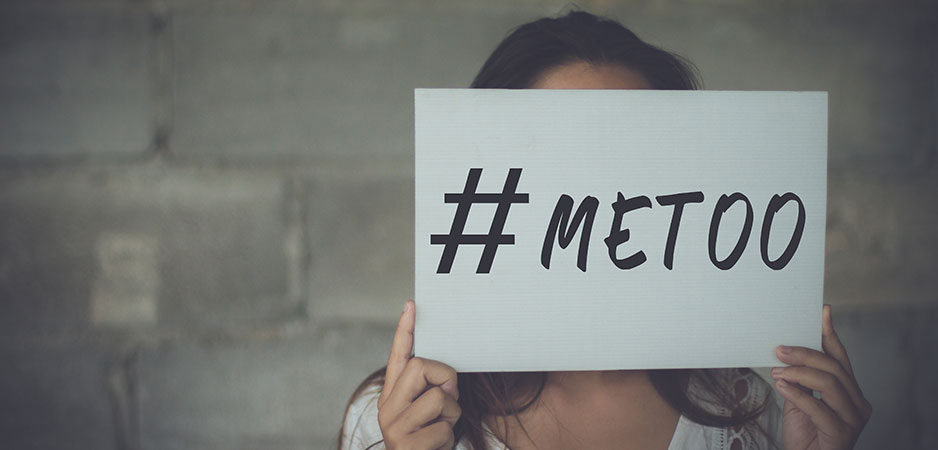The #MeToo movement immensely shifted public discourse in many Western countries, but it experienced slower development in Russia. It was dismissed at the highest levels of government as well as in provincial regions across the federation. Many of the tenets of the feminist movement were considered incongruent with Russian culture, views on gender and public discussion of private matters.
Domestic violence is a serious problem in Russia. Police statistics show that 15,381 women have been victims of violence in their home in the first nine months of 2019 and, according to Russia’s interior ministry, 14,000 women are killed each year as a result of it.
Numbers are often misleading, as following the decriminalization of domestic violence in 2017, the number of reported cases dropped from 65,543 in 2016 to 36,037 within a year. Violent acts did not become less common, but prosecution did. Most violence in the country goes underreported, as 72% of all women who reach out on domestic violence hotlines never alert the police. It is estimated that 1 in 4 Russian families experience some kind of domestic violence, and a recent study by independent journalists found that 79% of women convicted of murder have been sexually abused by their victims.
360˚ Context: The Me Too Movement — Changing the Rules of the Game
Polling conducted by the Russian Public Opinion Research Center, VCIOM, revealed that 49% of women believed they were in danger of violence in their homes, and 49% of respondents were subjected to inappropriate comments, remarks and crude jokes. A further 73% agreed that violence against women is a significant problem in Russia.
Despite these adverse circumstances, many Russian women persist in sharing their stories of sexual harassment and domestic abuse that have resulted in some identifiable breakthrough moments.
The Prettier Sex
Russia’s fledgling #MeToo movement has faced significant barriers entrenched in the country’s social history, where women have always been expected to fulfill domestic duties as wives and mothers. Domestic violence has always been widespread and brutal, with the phrase “If he hits you, he loves you” becoming firmly ingrained in the collective subconsciousness. The Russian Orthodox Church has historically espoused traditional gender roles, with “true manifestations of femininity” such as marriage and motherhood being presented as virtuous.
Similar views are expressed by the present-day clergy. For instance, Patriarch Kirill, the head of the Russian Orthodox Church, stated that feminism is a “very dangerous phenomenon” and that women should “focus on their families and children.” In 2011, Archpriest Vsevolod Chaplin blamed “immodest dress” as a provocation for sexual assault.
These views are not singularly characteristic of Slavic Russia. In 2016, an Islamic cleric from the North Caucasus called for female genital mutilation — a practice legal in Russia and still practiced mainly in Dagestan — as a way to counter sexual immorality. He contended that such an act would not interfere with the divine purpose of women: to birth and raise children.
At the same time, men continue to be prioritized as breadwinners and heads of the household who conduct their business almost entirely outside the home. Scholar Anne White contends that men have been viewed as the “more competent and authoritative sex” throughout history. This is telling in Russian society, where men still have great degrees of control over family finances, and monetary resources are thus correlated to power.
While the Bolshevik Revolution introduced new principles of egalitarianism, these were not exactly beneficial to women at large. Soviet women were some of the first to achieve suffrage in 1918, but under the Communist Party system they were expected to supply labor too. This state of affairs was amplified during World War II, when women had to take over roles vacated by men sent to the front. Women of this generation typically consider egalitarianism as problematic as it means they must actively balance two spheres of life: domestic and public. Russian women consequently question the usefulness of feminism if it results in a more complicated life.
In post-Soviet times, many traditional views returned, in part due to the increasing influence of religious leaders, with marriage and motherhood considered integral to a Russia woman’s happiness. Oksana Pushkina — a deputy with the United Russia Party who is actively working on legislation to overhaul current understandings of domestic violence, sexual harassment in the workplace and women’s rights in general — says that “Male advances are considered something to be celebrated,” suggesting a woman exhibits qualities that can technically lead to fruitful romantic relationships. They are often viewed as natural human reactions to feminine charm or a case of “boys being boys.”
Can’t Have It All
The utilitarianism promoted by communism was replaced with commercialism and the novelty of the affluent “culture of glamor.” This culture can be expressed as hyper-femininity or a focus on traditional depictions of female aesthetics, where women are considered to be “the prettier sex” rather than the “weaker sex,” as per Western lexicon.
Adherents of Western-style feminism — which delays marriage and having children in favor of a career — often conclude that women can’t have it all. Russian women, however, often dismiss feminist rhetoric in its entirety, with many prioritizing family over professional goals.
Sexual harassment and gender inequality are widely reported in the workplace as well. A 2016 holiday commercial by Moscow Credit Bank depicted working mothers in a negative light and consequently faced backlash. More recently, Tatprof, an aluminum company based in Tatarstan, sparked criticism for offering women bonuses for wearing make-up and dressing in a more feminine way.
The political system is also unfavorable when it comes to the rights of women. Sexual harassment, for instance, has not been criminalized under Russian law. The head of the State Duma’s Committee on Family Affairs, Women and Children Tamara Pletnyova dismissed the need for such legislation, stating: “We’re not in America or Europe. Why do we have to copy everything? A woman, if she doesn’t want to, won’t be harassed.” A gender equality bill 15 years in the making was subsequently struck down by the Duma in 2018.
High-ranking politicians have come out in opposition to feminism and the #MeToo movement. Russian President Vladimir Putin identifies feminism as a factor in the “moral decline of the West” and labeled #MeToo as a “media conspiracy.” Putin’s spokesperson Dmitry Peskov went as far as to call the American actors at the heart of the campaign “prostitutes” who sought financial gain.
Coming Around to #MeToo
All of these components of Russian society are exacerbated by the cultural habit of keeping such affairs private. Women often do not want to open up about abuse due to victim shaming and the manipulation of their personal stories. For example, an editorial posted on Russian news website Gazeta stated that women from all walks of life were afraid to discuss the topic as they would relive their humiliation and face accusations against their character. An alleged perpetrator could become a hero rather than an outcast.
The 2017 case of the 17-year-old rape victim, Diana Shurygina, offers a sad example. Shurygina was raped by a 21-year old man who was later sentenced to serve time at a penal colony. Discussions on Russian social media site Vkontakte revealed heated debate over the case and Shurygina was labeled as a promiscuous quean whose allegations ruined the life of a young man.
Shurygina appeared on a popular Russian talk show to discuss her situation, but found only criticism of her morals and actions. She became the butt of jokes and a source of viral internet memes. This reached a pinnacle when fast-food giant Burger King used an image based on her likeness depicting the amount of alcohol she consumed on the night of the rape to advertise a meal deal. At this point, many Russians realized the ad was in bad taste, voicing their displeasure to Burger King’s social media team, and it was removed.
As #MeToo gained momentum and American actors leveled accusations against film producer Harvey Weinstein, Russian celebrities remained in opposition. Actor Agnia Kuznetsova stated that she saw nothing unusual about an influential man utilizing his power to harass women and that her Western counterparts got what they wanted (roles) in the end. Another actor, Lyubov Tolkalina, took her comments even further, asking, “How can you blame a man for sexual harassment — isn’t it his meaning of life?” Tolkalina contended that it did not matter how an actor got a role, and that intimate encounters with filmmakers translate to better artistic expression on screen. She later recanted her polarizing comments.
The narrative began to shift when the country experienced its own unique #MeToo moment. In February 2018, four female journalists accused State Duma Deputy Leonid Slutsky of sexual harassment. Each woman worked for major media outlets at the time of the unwanted advances, and Slutsky’s political position meant the story was discussed widely across Russian media. While many parliamentarians supported their colleague, others backed the four journalists. Oksana Pushkina went as far as to publically state that sexual harassment happened behind closed doors at the State Duma, but few were willing to disclose of it.
An investigation by the Duma ethics committee later exonerated Slutsky. In protest of the ruling, numerous Russian-language media outlets boycotted news coverage related to the commission, Slutsky or the Duma in general. Independent outlet Meduza called for his outright resignation. While these intentions meant to serve a noble purpose, they did not last long.
Just months later, in November 2018, a sexual harassment scandal hit Meduza itself. The wife of an employee alleged that its editor-in-chief, Ivan Kolpakov, touched her inappropriately, saying that “You’re the only one at this party I can harass and get away with it.” Although Kolpakov stepped down pending an ethics review, he was later reinstated. The key outcome of these events is that Meduza acknowledged it was unprepared to handle such allegations and stated intent to establish a framework for future cases.
These events were the catalyst that generated discourse of topics that desperately needed attention and analysis. Russians learned that it was acceptable to talk about their own personal experiences after these highly publicized stories broke the silence. According to Daria Zhuk, one of the female journalists who accused Slutsky, “We need to keep talking about sexual harassment in Russia, and show people that it isn’t scary, but enormously important, to speak up. Only then can we really change the current situation.”
Changes in Attitude
The case of the Khachaturyan sisters further demonstrated changes in Russian public opinion in regard to the prosecution of domestic violence. The three sisters — Krestina (20), Angelina (19), and Maria (18) — stand accused of murdering their sleeping father in 2018 after years of traumatic physical and sexual abuse. It is alleged that the girls finally snapped after their father used pepper spray on them for leaving the living room untidy.
The lawyer for the sisters revealed that neighbors reported the abuse to the police numerous times, but law enforcement ignored it. The sisters told schoolmates what was going on at home, with the addendum not to tell anyone as they dreaded repercussions. Thoughts of running away were quashed with the same reasoning — their mother recently told the BBC that she was evicted from the family home at gun point.
All of this occurred during the period that Russia decriminalized forms of domestic violence and softened prosecution for such crimes. Despite this, the Khachaturyan sisters were charged with premeditated murder, with charges upgraded to those “committed by a group of persons or as a result of conspiracy.”
The high-profile nature of the case and the extent of the abuse caught the attention of the Russian public. Lawyer Alyona Popova stated: “Many people, not only women, but also men in the Russian Federation realize that this is not an isolated case.” Indeed, young men began sharing their stories of abuse and harassment as expressions of solidarity. Unprecedented protests countering the murder charges and domestic violence in general took place in Moscow and St. Petersburg, and a petition demanding a stop to the prosecution of the Khachaturyan sisters has received over 350,000 signatures.
Not Afraid to Say It
A new generation of Russian women is eager to embrace new philosophies and highlight discrimination within the country and have continued to raise awareness of women’s rights. Young Russians have taken to social media platforms boldly to share their stories and create hashtags unique to the #MeToo movement in the country. Even prior to the American phenomenon, women in the post-Soviet space widely shared the Ukrainian-sourced hashtag #ЯНеБоюсьСказати (“I am not afraid to say it”) to reveal their experiences with sexual harassment, victim blaming and issues with contemporary culture in regard to gender.
In 2018, the viral tag #этонеповодубить (“this is no reason to kill”) was accompanied by scores of young women posting seminude photos. It was in reaction to the murder of a woman at the hands of a young man whose advances she refused, claimed to have been prompted by her posting revealing images of herself. The hashtag was a reaction against what one user called blaming “girls for everything” and to push back against the idea that “Instagram photos can provoke a barbaric murder and rape,” as another comment suggested.
The case of Darya Ageniy initiated the online movement #саманевиновата (“not her fault”) in June 2019. Ageniy faces a prison sentence for stabbing an attempted rapist with a sharpened blade in 2018. She argues that the act was committed in self-defense and, while the man survived, police have not investigated his actions.
Another hashtag, #мне_нужна_гласность (“I need openness”), trended on Russian social networks in July 2019. Women continued to share their stories related to harassment and abuse, however, this time the focus was on collective action. The two women who launched the online flash mob stated that one woman is often ignored, but the voices of many expressing similar sentiments won’t be. They concluded that Russian men do not want to hear of the repercussions of their actions against women, so they would use social media to spread the word. It must be noted that while the hashtag pushed women’s rights squarely into public discussion online, it had detractors.
Soon after the “I need openness” campaign, the hashtag #янехотелаумирать (“I didn’t want to die”) emerged. Photographs of Russian women with painted bruises and injuries, with the hashtag phrase scrawled on their bodies, began to show up in timelines across platforms, primarily Instagram. The case of Olga Sadykova — a woman stabbed by her husband in front of her son in the village of Kumysnoye — caused human rights activists Alexandra Mitroshina and Alena Popova to create the original viral photo series. Sadykova reported abuse at the hands of her husband numerous times, but law enforcement only began to investigate him a month prior to her death.
Cultural Shift
Russian women and activists are now organizing to amend the current provisions covering domestic violence in the criminal code. All of this attention toward women’s rights issues means that focus cannot be turned away. It is safe to assume that young Russian activists thirsty for change will use social media as an outlet, but real change so far remains undetectable.
As Oksana Pushkina and the head of the federation council, Valentina Matviyenko, focus on submitting a new law to recriminalizing domestic violence, 200 conservative Russians defending traditional family values led a to challenge it. Leaders of the movement think that Russia does not have a domestic violence problem and that statistics are manipulated to suggest otherwise. They assert that a focus on any legislation countering domestic violence or the wider issue of women’s rights is part of a culture war by foreign agents to destroy the fabric of Russian society.
On November 25, a small protest demanding the recriminalization of domestic violence took place in Moscow. A mere 250 rallied on the International Day for the Elimination of Violence Against Women despite social media campaigns that garnered greater attention in the context of the #MeToo movement. It is apparent that the events of the last few years have done little to galvanize ordinary Russians against the mistreatment of women, and that the treatment and role of women in Russian society will continue to be disputed between rival social movements.
A form of the #MeToo movement will develop in Russia according to its own pace and cultural factors. It is unfair to try to gauge the success of this Western phenomenon in Russia, where generations’ worth of entrenched behavior won’t disappear overnight. But it is evident that a shift in perception of women’s rights will be a grassroots movement and definitely one that develops from the bottom up. A reliance on lawmakers and legislation does not prevent sexual harassment on the street or domestic abuse at home. Only an evolution of the social mindset does.
The key result of the #MeToo movement in Russia is that it has initiated public discourse on subjects that have previously been considered taboo. It is a fair assumption that Russia’s #MeToo will go through various transformations, emerging as a unique and integral movement.
The views expressed in this article are the author’s own and do not necessarily reflect Fair Observer’s editorial policy.
For more than 10 years, Fair Observer has been free, fair and independent. No billionaire owns us, no advertisers control us. We are a reader-supported nonprofit. Unlike many other publications, we keep our content free for readers regardless of where they live or whether they can afford to pay. We have no paywalls and no ads.
In the post-truth era of fake news, echo chambers and filter bubbles, we publish a plurality of perspectives from around the world. Anyone can publish with us, but everyone goes through a rigorous editorial process. So, you get fact-checked, well-reasoned content instead of noise.
We publish 2,500+ voices from 90+ countries. We also conduct education and training programs
on subjects ranging from digital media and journalism to writing and critical thinking. This
doesn’t come cheap. Servers, editors, trainers and web developers cost
money.
Please consider supporting us on a regular basis as a recurring donor or a
sustaining member.
Support Fair Observer
We rely on your support for our independence, diversity and quality.
Will you support FO’s journalism?
We rely on your support for our independence, diversity and quality.

















